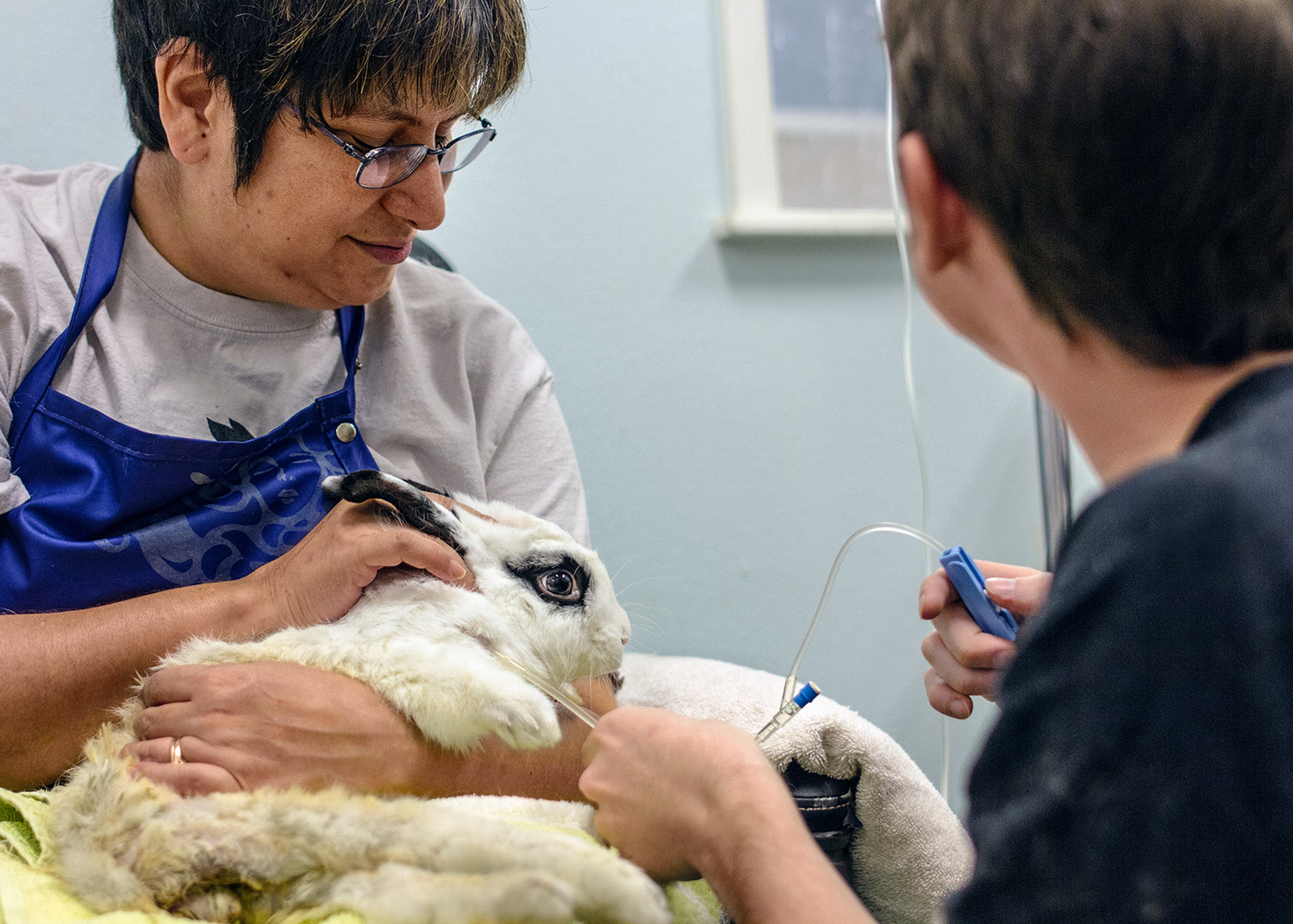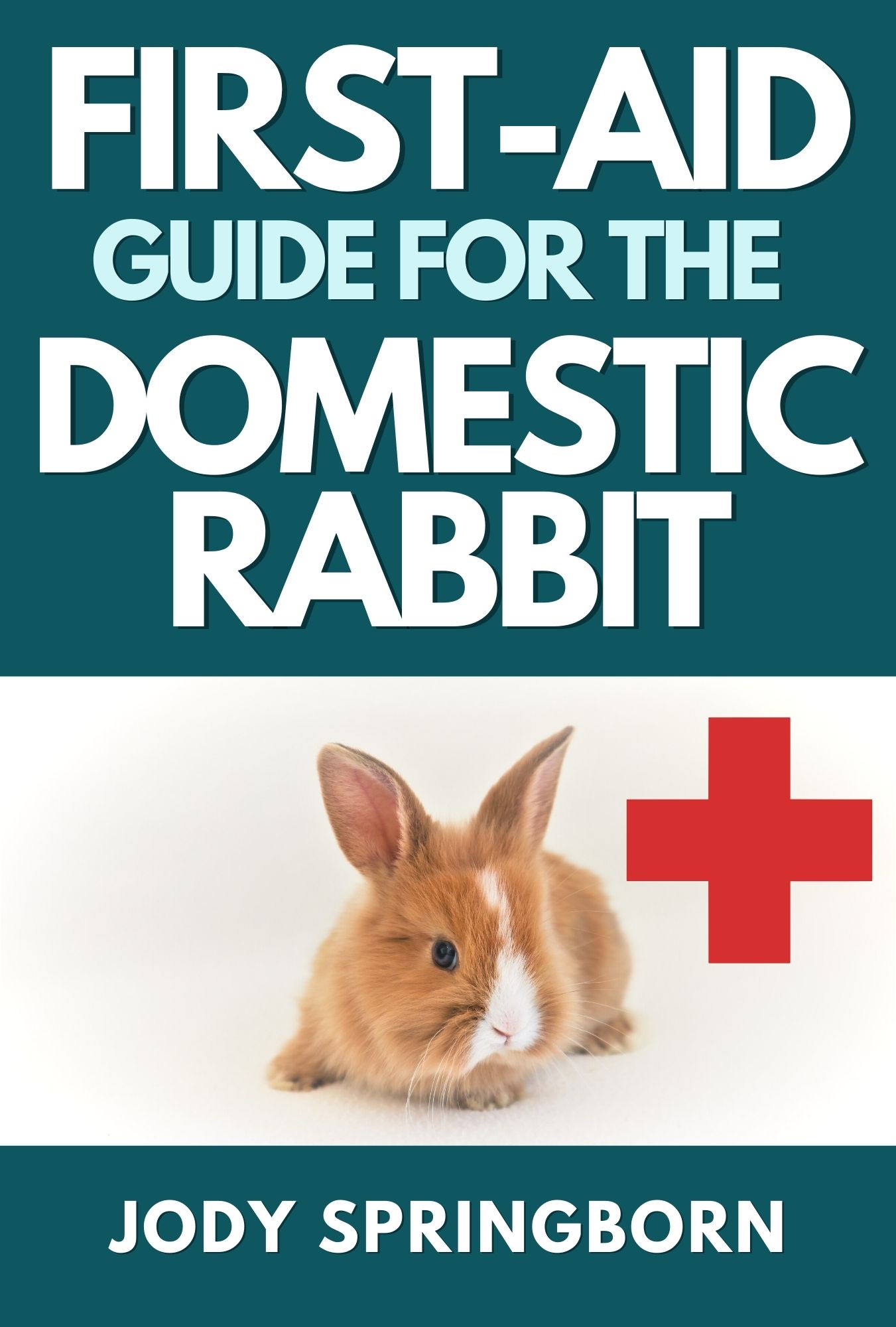- Home
- Rabbit Health Summary
Rabbit Health Summary
 Giving Diamond sub-q fluids.
Giving Diamond sub-q fluids.Photo by Dustin Yoder taken at BunnyLuv Rabbit Resource Center.
The information presented is for educational purposes only and does not substitute veterinarian care. This information should not be used for diagnostic purposes, for treatment of an illness or injury and never should be substituted for veterinarian care by a licensed veterinary practitioner. The Educated Rabbit cannot be held responsible for the accuracy of the information contained, nor be held responsible for any action, based on information found in The Educated Rabbit.
Seek advice from your veterinary professional for any rabbit health issues and before administering any drugs!
The Basics
Rabbit health is important, because rabbits are known for hiding illnesses and injury. This behavior is instinctual for prey animals, but causes difficulties for owners to recognize issues and address them quickly. Here is a summary of the most important points.
- Spay and neuter your rabbits. There are many good reasons why it's important to do this - both health and quality of life. In addition, this cuts down on the unwanted rabbit population.
- Providing your rabbits with a proper diet and housing can greatly reduce many health issues.
- Find your rabbit-savvy vet before you have an emergency.
- Rabbits get sick at the most inconvenient times (middle of the night, weekend, night before a flight, Christmas, etc). Have a First-Aid kit handy and make sure you know the location of your nearest emergency vet.
- Rabbits are notorious for hiding pain. They are very good at it. However, if you know your pet, you can tell when something isn't right. The sooner you address the problem, the quicker your bunny recovers.
Rabbits poop a lot. Their poop can tell you about the state of their health. The size, shape and color will be a good indicator of they bunny's health. Most experienced owners become experts on their pet's poop.
Common Health Issues
- GI Stasis. This is a very common ailment, in which the gastrointestinal tract slows down and the rabbit doesn't eat or poop. There are many reasons why a rabbit may go through stasis.
- Malocclusion. This is when the jaw and/or teeth are misaligned and cannot grind themselves down. This can affect a lot of dwarf and mini breeds, but any rabbit can have malocclusion.
- Fleas/mites. Fleas are not usually a problem for indoor rabbits, but if you have dogs or cats that go outside, the fleas can jump onto the bunnies.
- Coccidia. This parasite affects mostly vulnerable young and recently weaned rabbits. It usually presents itself as diarrhea and becomes deadly if not treated quickly.
- Sore Hocks. This frequently occurs when the rabbit is housed in inadequate conditions, such as a wire-bottom cage. if there is no place for a rabbit to stand on solid flooring, the bottoms of the feet can become inflamed and blister. If left untreated, an infection can start. In severe cases, the infection can settle in the bones requiring amputation.
- Urine Scald. This takes place when a rabbit either sits in urine or he urinates on himself. Depending on the reason for the scalding, the bunny may require surgery or adjustments to his housing and/or litter box.
- Flystrike. This occurs when flies lay eggs on the rabbit. When the eggs hatch, the maggots will burrow into the rabbit. This is usually a problem for a bunny who lives outside, but it can also affect indoor bunnies if flies come inside. Bunnies who may have an open wound, have mobility issues or overweight are most at risk. The quicker the maggots are discovered and treated, the better the chances the bunny will survive. However, this can be a deadly condition. Immediate vet care required!
- Pasteurella. This is a bacterial infection, which can show up as anything from a respiratory infection (upper and lower), to an abscess (found on any organ, including bone). Most rabbits have the bacteria and are asymptomatic. It can emerge if the bunny is stressed and the environmental conditions are inadequate.
- Abscesses. Abscesses pose a unique problem for rabbits, as they tend to form them very differently from other mammals. Rabbit abscesses are thick, much like toothpaste. This makes draining ineffective. Many times, surgery is needed to get rid of them completely.
- Bloat. This is an obstruction somewhere in the GI tract. This is an emergency!!! Immediate vet care required!
- Head-Tilt. This is where a rabbit may tilt permanently at a 90 degree angle. Depending on the cause of the tilt, the rabbit may recover fully with aggressive medical treatment.
- Encephalitozoon cuniculi (E. cuniculi). This is a microsporidan parasite that affects the majority of rabbits in the United States. Most of the time rabbits are asymptomatic, but it can cause hind-end weakness, head-tilt, cataracts, kidney and bladder issues. An infected rabbit cannot be cured, but the symptoms can be managed.
Available Now!

Often times, rabbit health issues require immediate attention. My First Aid Guide for the Domestic Rabbit will show you the most common health issues and teach you the basic skills you should have when your bunny needs you the most. There are over 100 color photos that show you all the supplies you need and how to help your rabbit in easy to follow step-by-step instructions.


